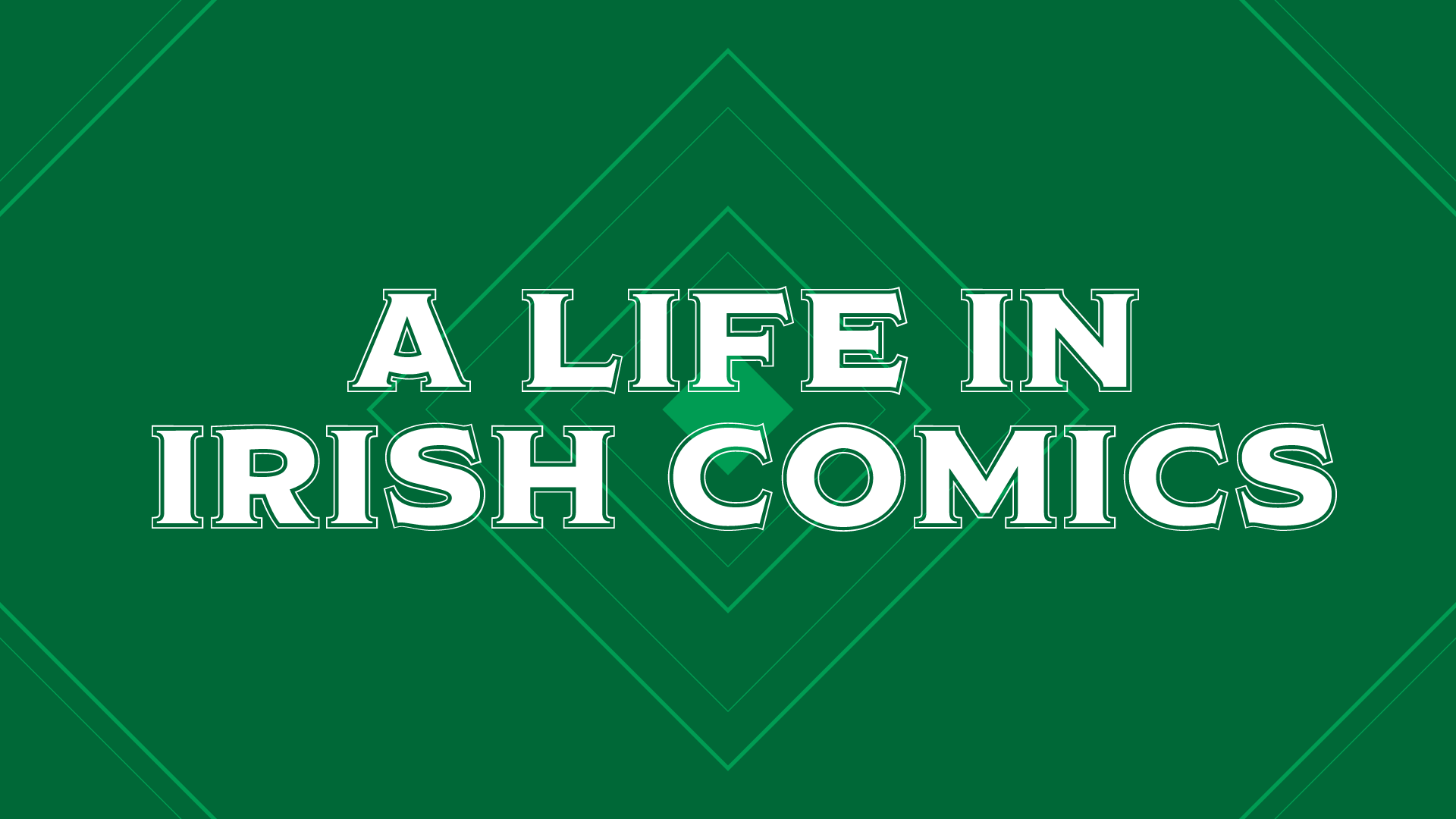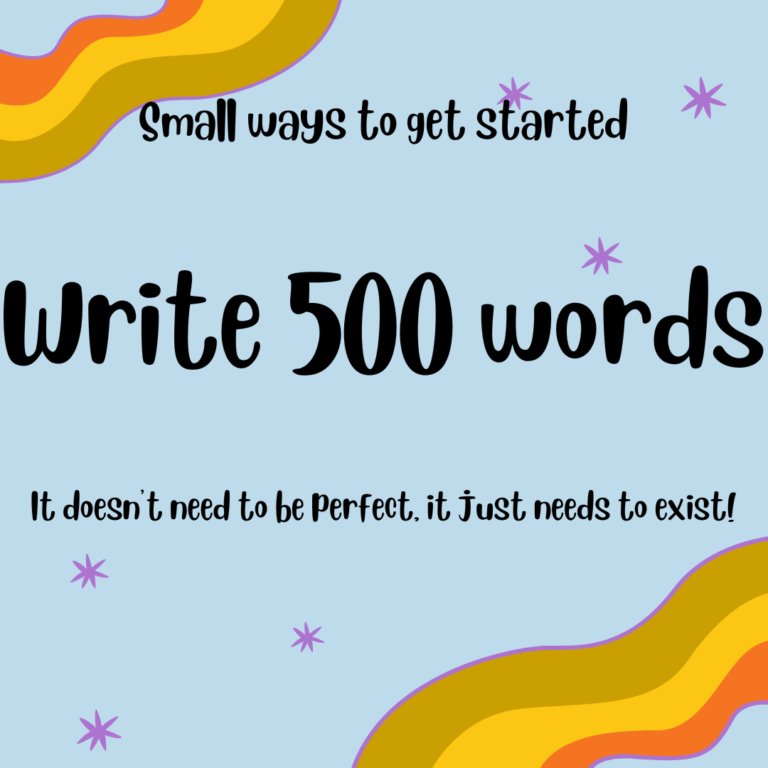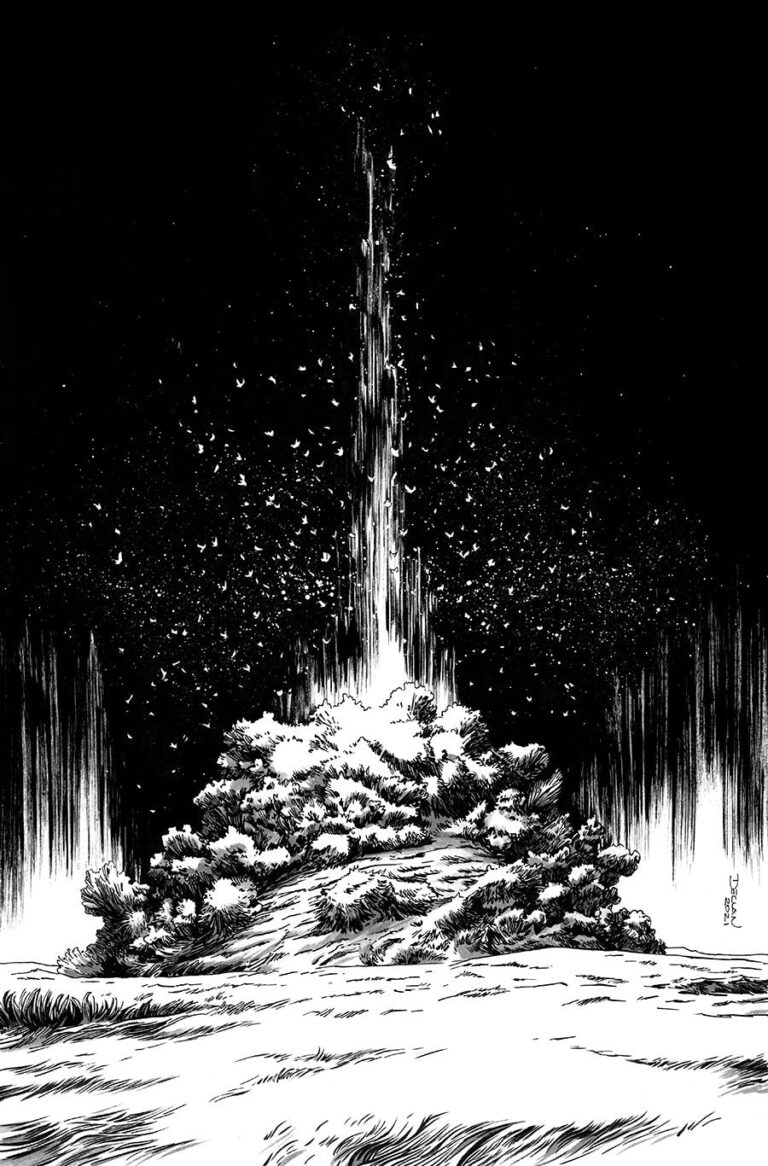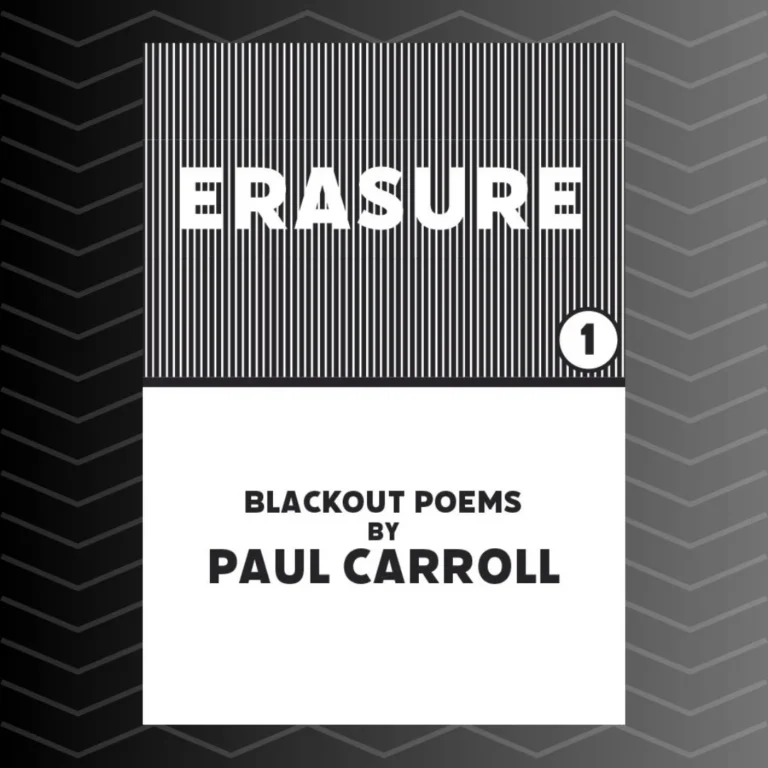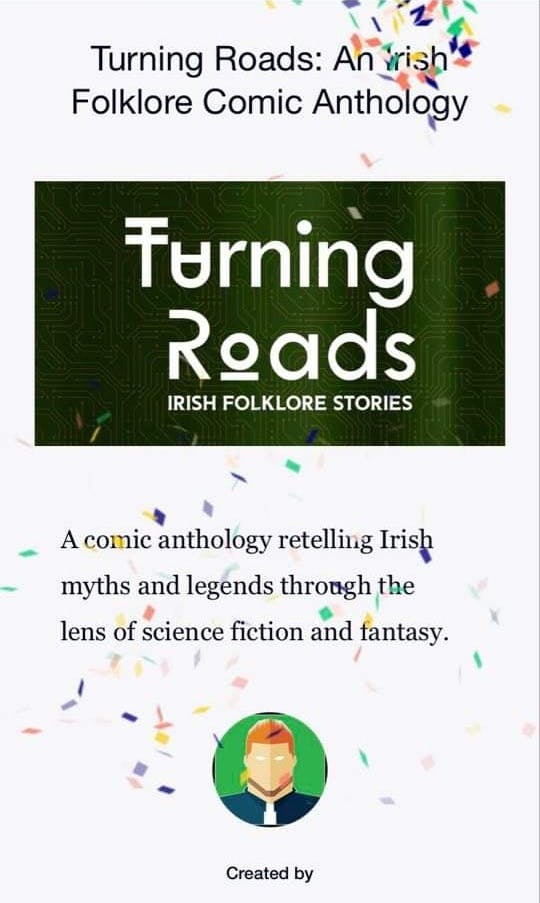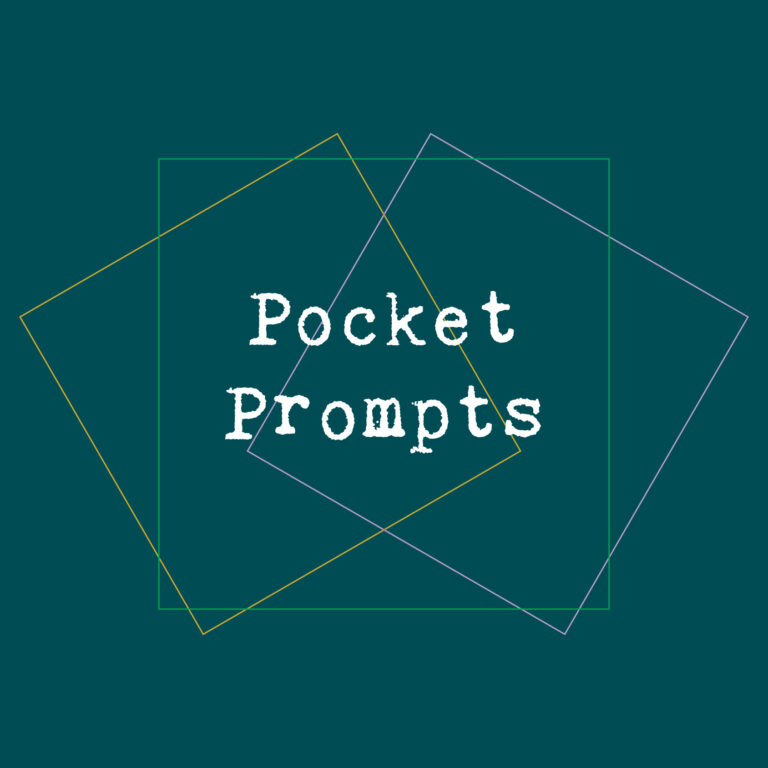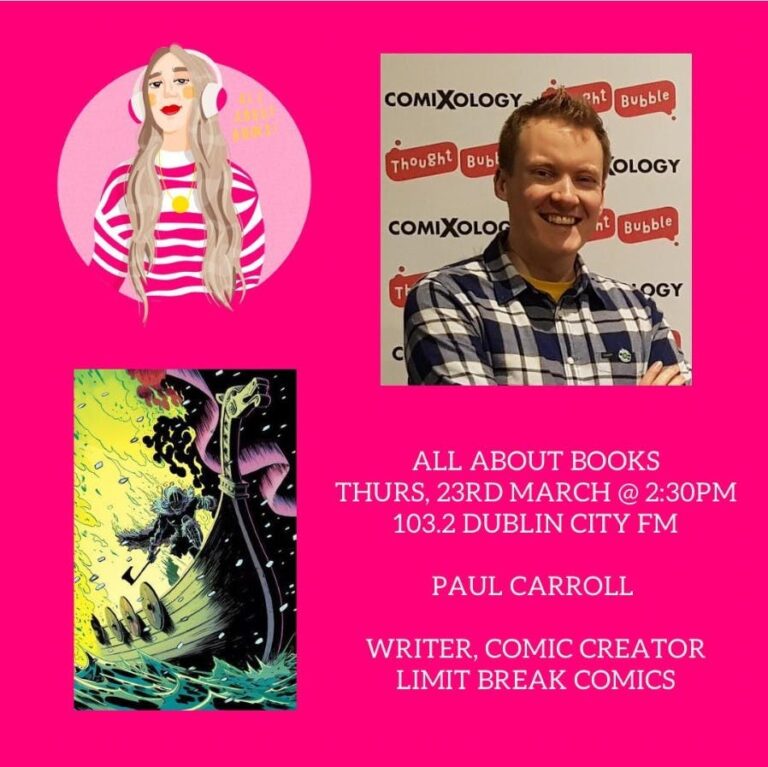A Life in Irish Comics
Before 2015, my only engagement in the Irish comic community was a fan of a few select small press comics – notably, The Wren from Buttonpress Comics, and just about anything Anthea West published; I’ve known her since 2007, and she was the only person I knew who made comics. As someone who’s constantly trying to encourage more people to join the community, I thought it was about time to detail how I got involved in this wonderful community and how others might follow suit. Hold on, folks, this is a long one!
The Pre-Comics Era
My first steps into the community were during my time in Dublin City University, as a student in the Multimedia Masters course. Our thesis projects were group assignments, and the full weight of nerdom and a couple of artists and designers on our team, we stepped towards the notion of producing a web documentary about comic book culture in Ireland.
That summer, the CO/MIX team set about interviewing comic creators, other professionals, and cosplayers, while attending conventions around the country. In that time, we met up with:
- Will Sliney (Marvel Artist)
- Paddy Lynch (Independent Artist, O’Brien Press Artist)
- Triona Farrell (Comics Colourist, now too many publishers to list)
- Anthea West (Independent Artist)
- Emma Byrne (O’Brien Press Editor)
- Eoin McAuley (Lightning Strike Editor)
- Stephen Lynch and Tina Brannigan (Cosplayers)
- Ryan Wade & Danielle Smyth (Cosplayers)
- Paul Raven & Louise Higgins (Cosplayers)
- Robert Glick (Comic book grader and collector)
Some of these interviews were conducted in studios and homes (including a day-trip from Dublin to Ballycotton!), others at arranged locations (including a pub that wasn’t yet open, and a boiling glass room in DCU) and others still at conventions, unplanned but perfect for what we were looking for.
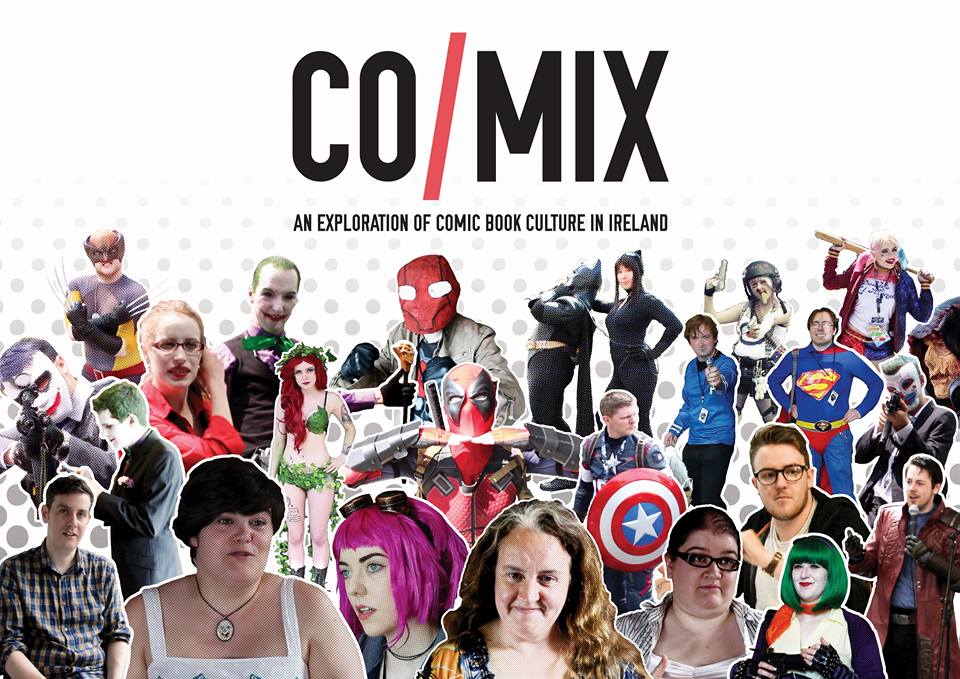
The events we attended don’t all exist today, and the ones that do will have changed quite a bit since we visited nine years ago. In order, they were:
- Anime Dublin (our test-day for pitching the project to our supervisors)
- Ireland Cosplay Con
- Dublin Comic Jam
- Comic Labs
- Q-Con
- Arcade Con
- ComicBooks.ie Mini-Con
- Dublin Comic Con
At each of these, I made a point of talking to as many comic creators as possible. I hadn’t been to a convention before. I hadn’t been to the Comic Jam or the Comic Labs. I hadn’t realised how many events ran in Dublin alone (we are spoiled for choice). This of course meant that I ended up buying a lot of small press comics. And I was only getting started.
7 Tips for Attending Conventions for the First Time
Attending events for the first time can be a lot. Here are some things I wish I had known before attending my first conventions, and things I’ve learned in the 9 years I’ve been doing this.
- Make a plan for how you want to spend your day
- Set a budget
- Let someone else stop you making further purchases
- Bring food and water
- Be prepared to be both too hot and too cold at separate points of the day
- Bring deodorant
- Figure out where the toilets and quiet rooms are
Once I’d become accustomed to the Irish comic community – and knew many of the creators by name and had a collection of books to read – the next step in my journey began: running an event.
The Geek Mart and Early Zines
In 2016, I began working with a group of artists and traders in the development of The Geek Mart, a monthly market in Dublin that formed on the back of the ComicBooks.ie mini-con, while being distinct in its branding and priorities.
It was the first time I ran an event, and the first time I was selling my own books at an event. At the time, I was peddling The Rebirth Cycle with new covers, and making some (not great) prints to sell alongside them.
A little while into the running of the Geek Mart, I teamed up with Gareth Luby on our first zines: How to Live With Your Cat (When Your Cat is an Internationally Renowned Assassin) and Meouch: Operation Bad Dog.
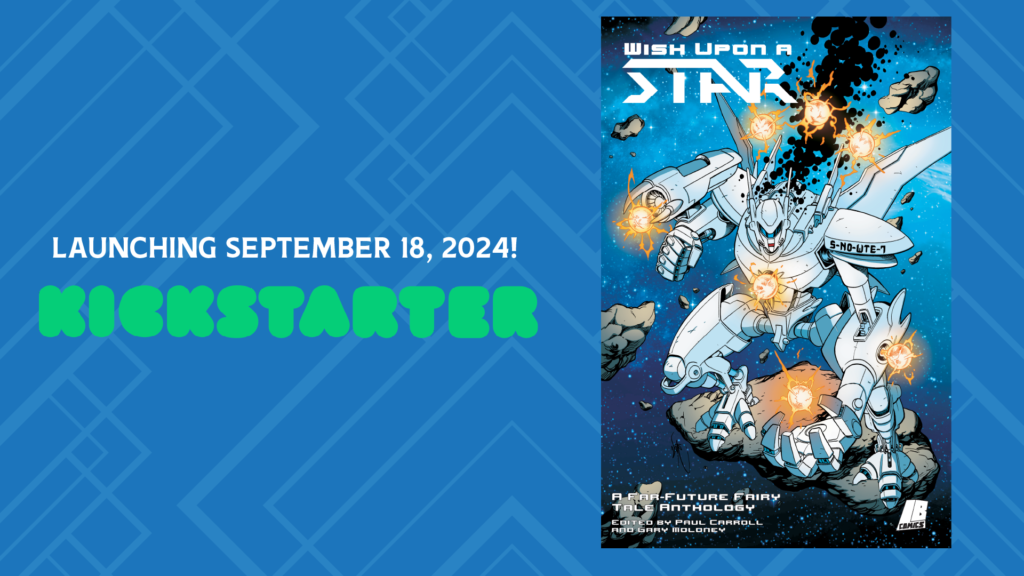
We launched How to Live With Your Cat at Small Press Day 2017 – where we met Gary Moloney. I had been involved in the running of the event, on the back of my work with the Geek Mart and having been involved in the community from a comics journalism perspective between the CO/MIX documentary and joining the Geek Mart team. Shortly after that event, myself and Gareth tabled at Dublin Comic Con (my first time!) to launch Operation Bad Dog.
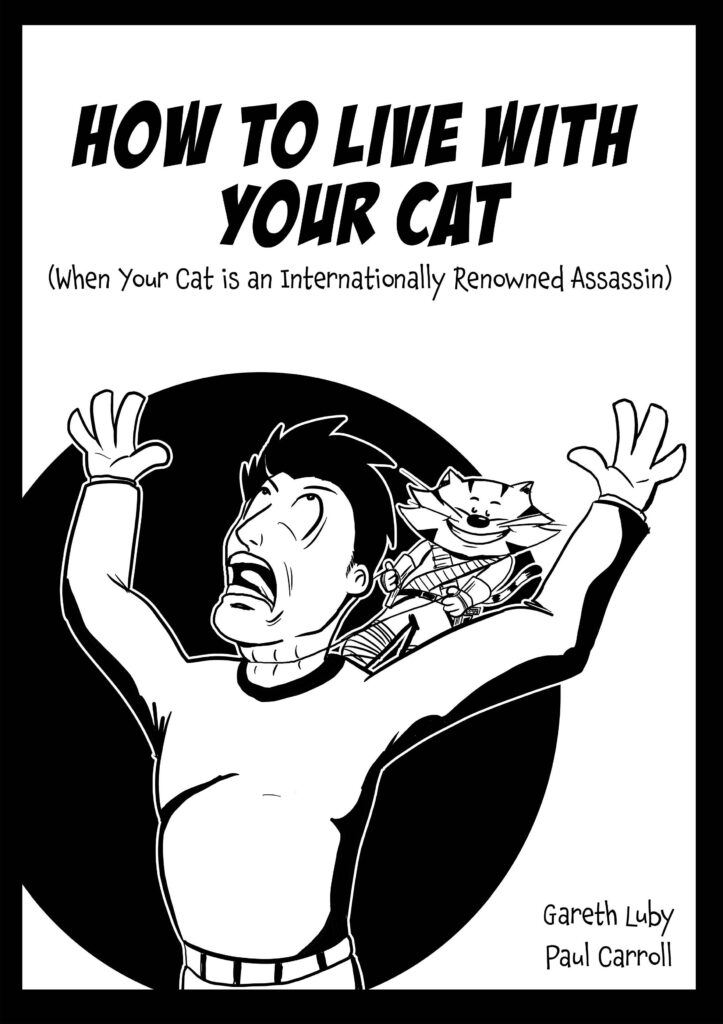
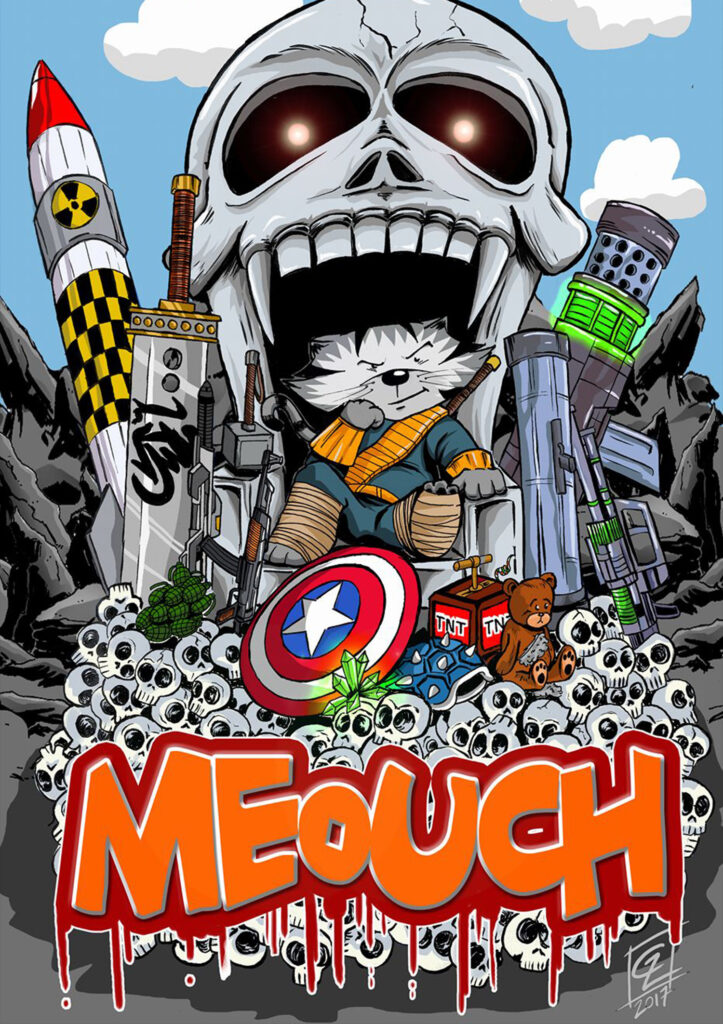
One thing I would definitely recommend is to not run a monthly market, while working full time, and trying to get started making comics. We dealt with this by turning the Geek Mart into a quarterly market, to reduce the workload required all the time in running the event, while growing the physical space we could use to run the event.
While the Meouch franchise continued to develop – with an activity book and Frankie’s Big Book of Assassination – the discussion about how myself, Gareth and Gary would work together began in earnest. We had been to conventions around the country, from Wexworlds and K-Con, Dublin Comic Con and the Cork Comic Expo.
And then we landed on our name, and set our plans in motion.
The Launch of Limit Break Comics
In April 2018, myself, Gareth and Gary headed to Cork for the Cork Comic Expo. It was there that we launched the Big Book of Assassination, and at that event that we settled on plans for the first books we would release as a singular brand. On the train home, I decided on the title of my first collection of comics, and recruited Gareth to do the art for one of the stories.
Around the same time, the plans for Small Press Day 2018 began to take shape, and we decided that if we could pull everything together in time, we would launch our little comic collective on the day.
We started with two books. Gary had Mixtape, a collection of six short stories in six genres, and I had Life & Death, a flipping horror collection where one side contained the violence of vampires and zombies, while the other side had ghosts and magic. While a couple of people balked at the idea of a new collective in town – we shan’t dredge up the past – others were delighted to see that comics could bring people together.
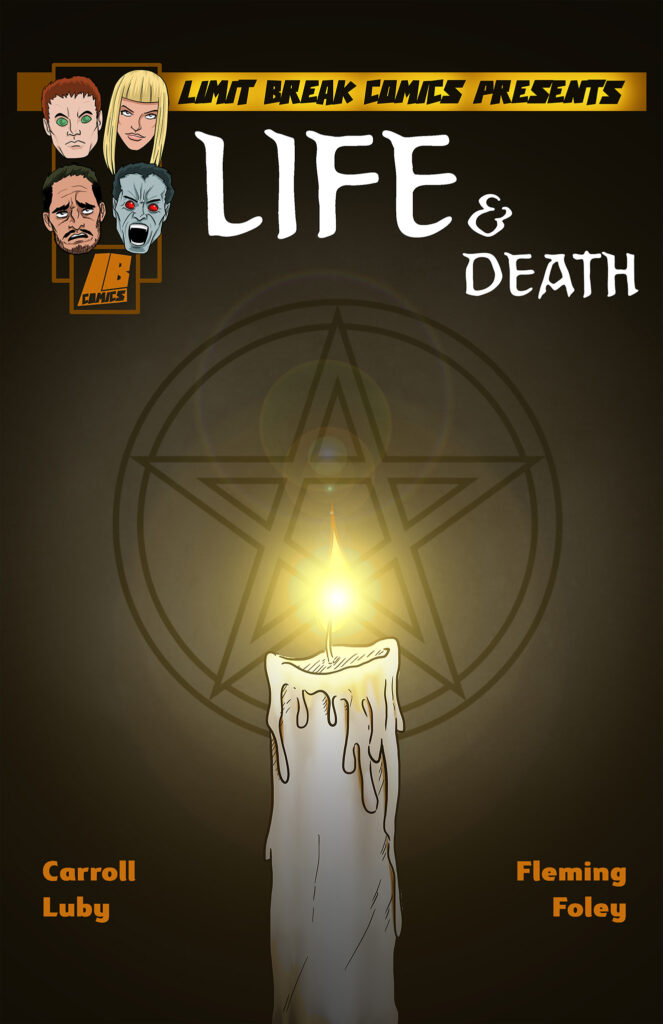
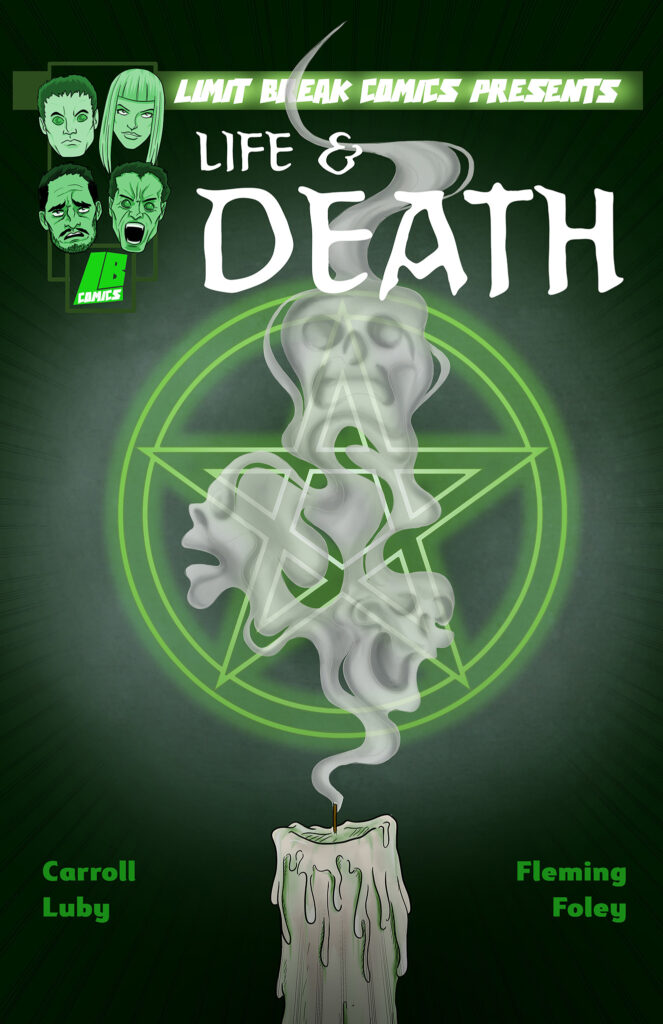
We had button badges, a website and two shiny new books, we took to showing the world what it was that we did and loved.
In the beginning, we had been calling ourselves a publisher, of course. This led to some weirder developments, from random messages with portfolios or requests for work from South American creators, to (not serious and short-lived) conflict within the group about what we called ourselves. Sure, calling ourselves publishers sounded nice, but it wasn’t what we were aiming to do. Gary was preparing to be a barrister, and myself and Gareth worked in a bank together while also running the Geek Mart.
Hence, comic collective.
The pressure was lifted, and our intentions to work as a group were re-solidified under the word. (This was all thanks to Gary pointing out that we didn’t set out to try run a publishing house, and that it would be a lot of work that we weren’t ready for.)
In December 2018, we shut down the Geek Mart, and our creative endeavours switched to making comics instead of event management. We had a book coming out, and plans for the future, and figured it was about time to say that our once-thriving market had maybe run its course. (It also coincided with the death of Stan Lee, which stung extra hard on the evening that our Christmas event was cancelled due to a double-booking by the venue two weeks out.)

Meouch, Plexus and the Start of Something New
In March 2019, the first issue of Meouch launched at Dublin Comic Con, and almost sold out. Whether people saw the cover first or our little foam cut out of our favourite little Murder Cat, the book was selling fast. And we weren’t going to complain.
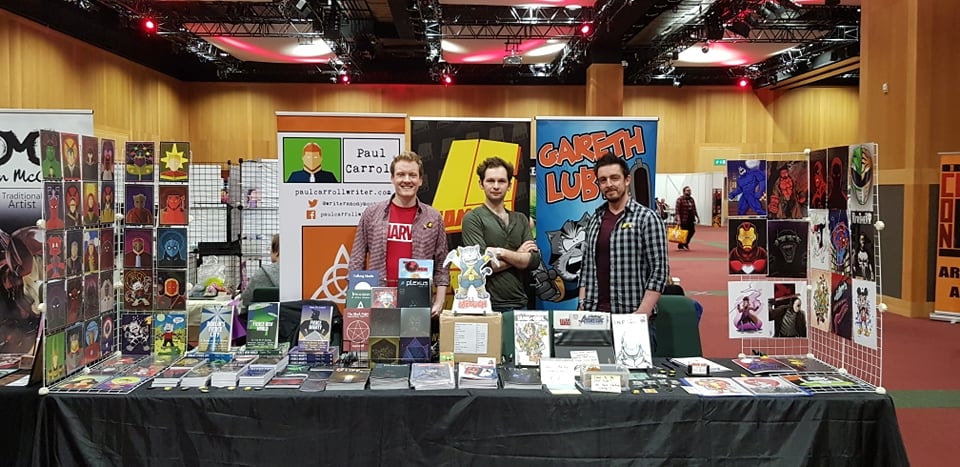
We rode the high of that launch through 2019, and I tested the waters with Kickstarter for the first time with Plexus #1. It was released in time for the summer Dublin Comic Con and Dublin 2019: An Irish WorldCon, which put Limit Break’s name in front of thousand of international fans of science fiction and fantasy. (Sidebar: It wasn’t a huge sales event, but that was a lot more people from outside Ireland who had never heard of us before seeing our banner in the trade hall.)
We thought the momentum would continue through 2020, and then…
Well, you know what happened next. The day before Dublin Comic Con, government restrictions called for a cancellation of the event. What we had been told would be a six-week affair did not end.
In the September, jobless and restless, I put the idea out into the world about doing an Irish folklore anthology. People liked the idea, and so began the big journey into myth anthologies that put us on the map. Sorta. I mean, we’re not huge, but the people who know about us respect the work we’re doing and that’s massive.
Turning Roads was funded in March 2021, and launched at our first ever time tabling at Thought Bubble that November. That weekend, we also announced our second anthology, Down Below, and kept up that tradition going forward.
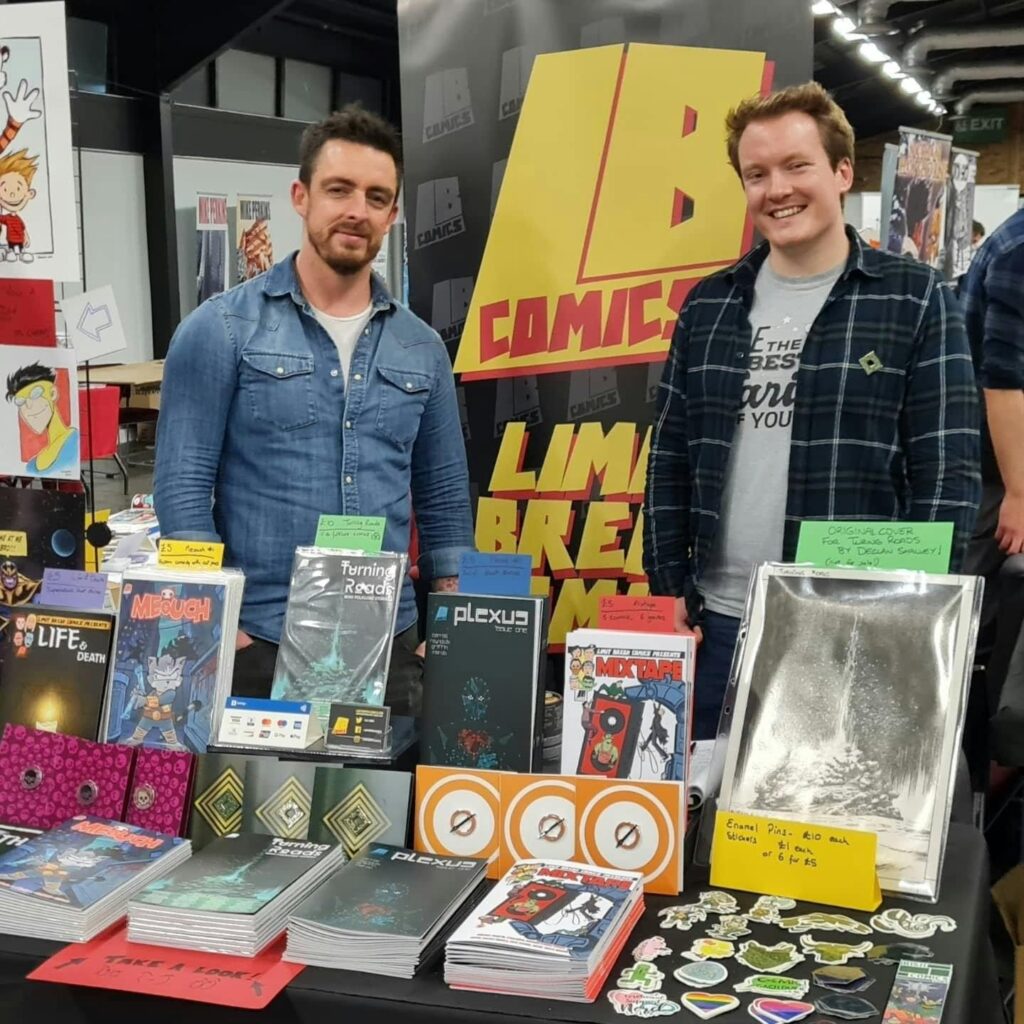
Dublin Comic Con returned in March 2022, and we used the event to launch several new books. Everything seemed to be going well, for us at least.
The Irish comic scene was looking a little bit different from when I started, though, so it’s time to do a small rewind and look at what went and what came.
5 Tips for Finding Collaborators
Finding collaborators can be difficult for many creators starting out. Here are five ways you can new collaborators to work with.
- Check the list of creators in a published anthology
- Roam the Artist Alley at your local convention
- Scour the #PortfolioDay tag on Twitter and Bluesky
- Ask for recommendations from others
- Post on social media that you’re looking for an artist
My main point of advice for reaching out to someone new is to be respectful, explain what your comic is about (very briefly) and inquire about their page rate.
DCAF, IrishComics.ie, the Changing Marketplace, and Comics in Lit Spaces
The very first DCAF ran in April 2017. At the time, it was competition to the Geek Mart, though it was much smaller than it is today and couldn’t cater to nearly as many comic creators as it does now. Once it moved to a larger venue – first the Chocolate Factory, and then Richmond Barracks – DCAF became the place for new creators to show their work.
The team behind DCAF largely came from what were the teams who ran the Dublin Comic Jam and the Comic Labs – remember those from way earlier in this article? The hard work of the committee has kept DCAF going, thriving on the other side of the pandemic and continually one-upping itself.
During that downtime in DCAF history, just after the funding of Turning Roads, I teamed up with some friends to launch IrishComics.ie – the first shared publication website of its kind for Irish comic creators. This brings us to a new development in the Irish comic community: the receipt of arts funding to make comics that aren’t tied to a publisher like O’Brien Press. IrishComics.ie received support from DLR County Council Arts Office, and later from the Bram Stoker Festival, for open calls and the production of new work.
In 2022, I was also in receipt of Arts Council funding specifically to publish Fractured Realms, while the DCAF team had received funding to publish HOME. Never before or since have Irish comic creators received funding in that was from the Arts Council. No prior relationships. No gigantic publishing history. Barely a team on either project, and no one doing it full time. For comic creators, this should be huge. There’s potential there, finally confirmed, to apply for funding to produce and publish new works.

Because this is the reality of making comics: it’s expensive, especially as a writer hiring a team. But even artists need to pay themselves to do the work. It doesn’t do to create a 150-page book but to have no money to keep you going while you do it. That’s not sustainable.
So, public funding. That’s a thing. And it’s the start of comic entering traditional lit spaces.
In the meantime, other developments that have taken place:
- I took part in the Evolution Programme by the Irish Writers Centre, as the first comics participant in the programme – I don’t want to be the only one!
- Irish comic creators are running workshops at literary festivals
- Irish publishers are beginning to publish comics for kids in a way that UK and American publishers have been doing for a while – Gill Books released the first one earlier this year
- Irish comic creators are popping up in just about every publisher in the world
- More comic creators are putting work together that haven’t published anything before, from writer-artists like Eoin Barclay who came out of nowhere, to people like my students in the Irish Writers Centre who’ve produced scripts and are (hopefully) looking at getting them made
Then and Now
The scene looks very different now than it did when I joined almost a decade ago. Of the eight events I attended for my thesis, only two are still going. But since then, more conventions and events have popped up. From DCAF and Small Press Day to a plethora of anime and gaming conventions, there’s no shortage of Irish markets and conventions for people to bring their work and for audiences to find something new.
While we have no more comics journalism websites in this country, the traditional media are paying a bit more attention to press releases. Things are different, and in many ways better, and I’m hopeful that as a community we can continue to thrive. I’m nine years in, and I love it more than ever.
